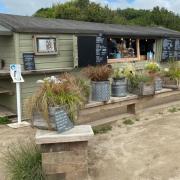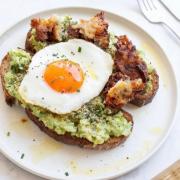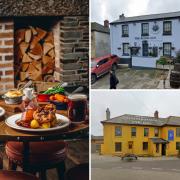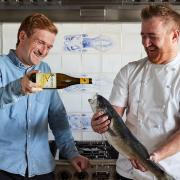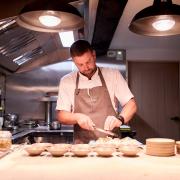Do you know your Liskeard Gillyflowers from your Collogett Pippins? This autumn, experience a taste of history as Fower Valley Cidery and Distillery releases a unique range of Old Cornish Ciders from endangered apple varieties like these.
Next time you pass an apple tree growing in a hedgerow, peaking above an old garden wall, or providing a shady picnic spot on a village green, take a moment and have a closer look – you might be in the presence of history.
The apple certainly didn’t originate from British shores; it’s thought the ancestral home of the fruit is the Tian Sham mountains of Kazakhstan, from where they made their way along the silk road to Western Europe and eventually worldwide. However, this versatile fruit has become entwined in our cultural, social and religious makeup, with local breeding resulting in a plethora of unique cultivars with location specific qualities. Sadly, many of these hyper-local varieties are close to extinction, but they do have some impressive apple aficionados fighting their corner.

For James Evans and Mary Martin, the discovery, cataloguing and preserving of Cornwall’s historic apple varieties is a labour of love, and one they are keen to pass down to the next generation of apple hunters. To this end, the illustrious pair of experts – authors of A Cornish Pomona – considered to be the ultimate guide to local varieties, have collaborated with renowned cider makers Fowey Valley to produce a very special series of ciders.
The ciders are blends of small parcels of fruit from James and Mary’s ‘mother orchards’ – two precious repositories of the apple varieties they have found and preserved during their 40 plus years of research and specimen collecting. East Malling Research Station in Kent have analysed the DNA of many of their finds, and genetic fingerprinting is revealing interesting tales about the origins and migrations of Old Cornish varieties over the years.
Quite often the results of this scientific analysis come back as 'unknown variety', giving James and Mary the task of naming them. Hence their book and orchards contain many varieties with wonderfully evocative inherited or given names such as Grow-Bi-Nights, Whitpot Sweet, Pig's Snout, Pengelly, Manaccan Primrose, Hocking's Green, Collogett Pippin, Liskeard Gillyflowers, Limberlimb, Ladies Fingers, Banana Pippin, Pendragon and Long Keeper.

For Barrie Gibson, Founder and Master Cidermaker at Fowey Valley, this collection of trees and knowledge is a precious assemblage of red, green, brown, and yellow-hued jewels; an astounding resource to have access to. 'Last autumn, we had the pick of these incredible orchards,' explains Barrie. 'After much enjoyable pontificating between the three of us, we ended up with five barrels of juice in various combinations of apples which our combined knowledge of cultivars and cider-making told us would work well together.'
Following the various stages of fermenting and racking, the juice has been bottled and labelled using artwork by Mary, who trained at the Royal Academy Schools and has been a professional artist as well as an apple activist since 1975. Mary’s beautiful paintings are an exuberant celebration of nature and rural life in the Tamar Valley, with a particular focus on orchards of course. 'I can’t think of anything more appropriate than Mary’s rich and bucolic paintings to adorn our Old Cornish range of bottles,' says Barrie.
The five small-batch ciders are available in very limited quantities and sold on a first-come-basis at Fowey Valley Cidery in Lostwithiel and online. The trio hope to repeat the experiment again in future years with further releases of the Old Cornish range, no doubt to the delight of apple and cider enthusiasts.

Every autumn, Barrie also invites local people to bring their excess apples along to add to this years’ Fowey Valley general pressing for his Castledore Cider, offering to swap fruit from small orchards and gardens in return for award-winning apple juice or cider. 'We’re happy to receive any excess local apples, as long as they haven’t been sprayed with pest-eradicating chemicals,' explains Barrie. 'The exchange is a great way for us to get to build knowledge of local cultivars and have conversations with people about their apple trees. Of course, if we come across something unusual, we know who to call!'
If the exchange of excess apples for delicious juice and cider encourages people to keep their trees and understand a little more of their value, James and Mary will be happy. 'The ‘march of progress’ in food production has led to mono-cultures taking over, nurturing uniformity and putting traditional regional varieties in danger,' James explains. 'Because of this, the supply system is growing ever more vulnerable to adverse weather conditions – exacerbated by climate change – and resistant pests. That doesn’t just apply to apples of course, the same issues affect many of the crops which form a big part of our diets.'
Conversely, the rare cultivars James and Mary work to discover and protect are resistant to things like canker and scab, which can be a huge problem when national varieties are grown in the damp west country. 'It is only by preserving the historic cultivars that their genetic value can be judged, and they can be preserved for the future breeding of new varieties,' says Mary. 'Grown organically in our mother orchards, their natural resistance can be clearly observed.'

James and Mary, now in their 70s, have achieved something remarkable. In their spare time, and with limited resources, they have nurtured a seed bank of genetic code which could be enormously valuable in pursuing solutions to challenges we have yet to encounter. They’ve also created a repository of social history, told in each crisp bite of the nation’s favourite fruit. foweyvalleycider.co.uk
















